Walter Jon Williams Explains Why UFOs Are Actually Made of Bread, and Other Little Known Facts
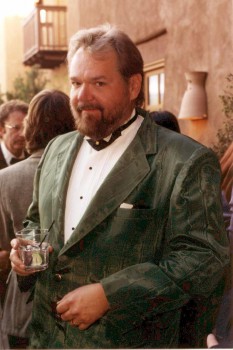 The first time I saw Walter Jon Williams, he was singing a song to mock Asimov’s then editor, Gardner Dozois. Melinda Snodgrass, Ellen Datlow, and Pat Cadigan sang backup.
The first time I saw Walter Jon Williams, he was singing a song to mock Asimov’s then editor, Gardner Dozois. Melinda Snodgrass, Ellen Datlow, and Pat Cadigan sang backup.
My second sighting was a picture in that month’s Locus of Walter standing with Daniel Abraham and his bride, Kat, several other writers, and a toilet prominently displayed in the foreground. Said toilet was the writers’ group gift to the newlywed couple. Rather than slip a gift receipt into a card, or have the toilet delivered to the house, the writers group decided to carry the appliance into the reception on their shoulders.
And no, neither of those are the craziest stories I know about the award winning, bestselling author, Walter Jon Williams. By all means, read on!
An Interview with Walter Jon Williams
Conducted and edited by Emily Mah, February 2012
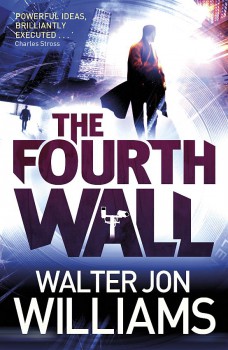 Emily Mah: Can you tell us about this latest book release? What’s the book premise and how did you decide to develop it into a novel?
Emily Mah: Can you tell us about this latest book release? What’s the book premise and how did you decide to develop it into a novel?
Walter Jon Williams: May I point out, just at the start, that despite their arcane subject matter, these books are actually fun?
I mean, there is cottage cheese wrestling. That’s not too terribly profound, is it?
That said, The Fourth Wall is the third book in the series of near-future thrillers featuring game designer Dagmar Shaw, following This Is Not a Game and Deep State.
(Each of the books can be read independently. For the month of February, e-versions of the first book will be available for a mere $2.99!)
Each book concerns the possible impact of Internet culture and technologies, as exemplified by techniques created for Alternate Reality Gaming.
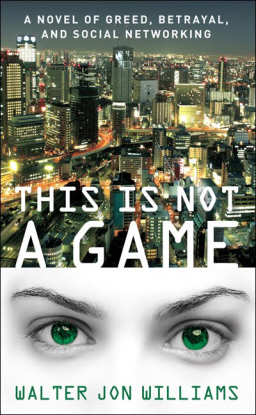 (Briefly, Alternate Reality Gaming is the first art form made possible entirely by the Internet: it’s distributed through cyberspace; and it’s multiplatform and multimedia, and may include text, video, audio, graphics, games, puzzles, codes, cyphers, steganography, raw data, and any other method of relating and enhancing a story.)
(Briefly, Alternate Reality Gaming is the first art form made possible entirely by the Internet: it’s distributed through cyberspace; and it’s multiplatform and multimedia, and may include text, video, audio, graphics, games, puzzles, codes, cyphers, steganography, raw data, and any other method of relating and enhancing a story.)
The first book in the series, This Is Not a Game, explored the relationship between the reality of an online game and our own consensus reality, with characters trying to manipulate one through the other.
In the second book, Deep State, Dagmar tries deliberately to manipulate reality through gaming techniques, by way of creating a social media-inspired revolution in the Mideast.
(The book appeared the week the Egyptians occupied Tahrir Square, making me a better prophet than I thought I was.)
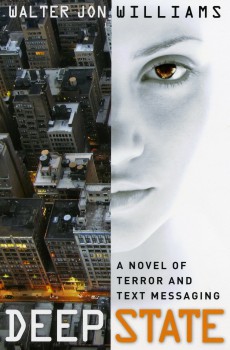 Now in The Fourth Wall I’m exploring the future of entertainment, as Dagmar dives into the most morally bankrupt, corrupt, insidious, and dangerous environment of all . . . Hollywood.
Now in The Fourth Wall I’m exploring the future of entertainment, as Dagmar dives into the most morally bankrupt, corrupt, insidious, and dangerous environment of all . . . Hollywood.
For several years now you’ve run a writers’ workshop called Taos Toolbox with several other luminaries in the speculative fiction writing world. Could you tell us a little bit about the workshop, whom it’s intended for, and how it is structured?
Taos Toolbox is a workshop I’ve created for writers who haven’t really broken into the market yet, but aren’t beginners, either. I call it a “master class,” but don’t let that scare you.
For two weeks in the summer, I rent an entire ski lodge at Taos Ski Valley, and I and other instructors and the students work on our fiction.
We do a lot of things that other workshops do: round-robin critique, talks on world-building, character-building, exercises, contracts, etc.
We also do something few workshops do: we will workshop novels, and we’ll spend a whole week on plot, structure, and pacing.
Teaching that is really hard, which is why so few other workshops even approach the topic.
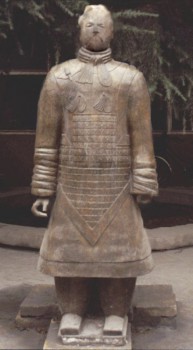
This year I will be teaching along with Nancy Kress, who is absolutely sublime as a reader and teacher. And we also have hot young writer Daniel Abraham as special lecturer.
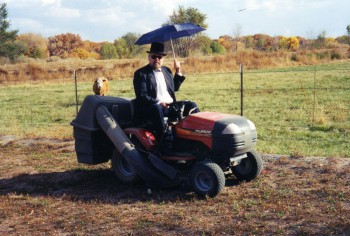 In addition, the workshop takes place in an absolutely gorgeous mountainside retreat complete with hot tub, wi-fi, and an occasional bear.
In addition, the workshop takes place in an absolutely gorgeous mountainside retreat complete with hot tub, wi-fi, and an occasional bear.
Meals are catered, and if you get stuck staring at your keyboard, there are plenty of other things to do: hiking, horseback riding, river rafting, and wandering through the wonderland that is Taos.
We’re still accepting applicants for this year. For information, please go to www.taostoolbox.com.
Many people will see your name and have an image of a man who’s been comfortably self employed as an author for decades. Few know the real ups and downs of a career. I’m often amazed at what you manage to survive; it’s a real testament to your commitment and artistic versatility. Could you pick an event or two (or more even) from your career that challenged you and share them?
I’m the only writer I know who has actually been blackmailed by an editor, who told me that he wouldn’t pay me for my novel unless I did another, very different project for him.
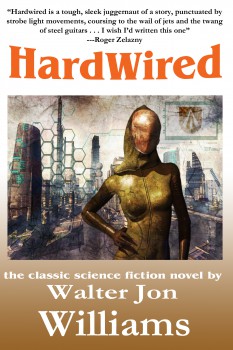
The whole story (and much else) can be found in an old blog post of mine.
I’ve also been told — by a major publisher, no less — that they would publish my book, but not pay me the agreed advance. Before the dust settled on that one, lawyers were involved.
You’ve written hard science fiction, fantasy, mainstream thrillers, and several works that will defy categorization. What influences your decision of what kind of project to pursue next?
Like most writers, I have more ideas for books and stories than I can cram into half a dozen lifetimes. When I’m working on one project, I’m always thinking about the next (or two, or three).
When it’s time for a new proposal, I pick several of the ideas I’ve got running through my head, consult with my agent, and write the one that he thinks he can sell.
Of course sometimes one grabs me and won’t let go, and I write that one no matter what my agent’s good advice might be. That’s what happened with Hardwired, which everyone thought was unsaleable and which turned out to be my most popular work.
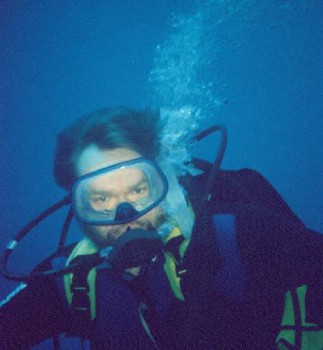 Despite your success as a novelist, you still put enormous time and effort into producing great works of short fiction. Do you have any more short story releases coming up that you can share?
Despite your success as a novelist, you still put enormous time and effort into producing great works of short fiction. Do you have any more short story releases coming up that you can share?
I think my shorter work is my best, and (although I probably lose money on every short story sale), I’m very happy to devote time to short fiction.
Coming up this autumn is The Boolean Gate, a novella from Subterranean, which will be available both as a chapbook and a story in their online magazine. It’s a long novella featuring the complicated secret history of Mark Twain and Nikola Tesla (who, in real life, were friends).
You’ve also done some writing for video games. How did that compare to writing novels and short stories?
Some of my game work, as with the Hardwired RPG, just involved downloading what I already knew about the background of the novel into text form. That was easy.
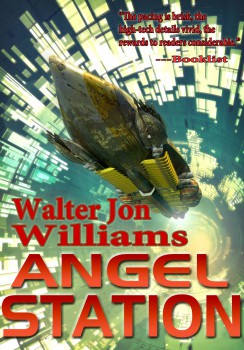 Other game writing, such as the dialogue for EA’s game Spore, was fairly arduous. I had to fill in every possible niche on the game’s decision tree — essentially, I had to come up with 128 ways to say “No,” 128 ways to say “Yes,” and 256 ways to say “Maybe, but I want something first.” It was not a game. It was work.
Other game writing, such as the dialogue for EA’s game Spore, was fairly arduous. I had to fill in every possible niche on the game’s decision tree — essentially, I had to come up with 128 ways to say “No,” 128 ways to say “Yes,” and 256 ways to say “Maybe, but I want something first.” It was not a game. It was work.
The most fun was writing for the online Alternate Reality Game Last Call Poker. I got to write text, comic books, radio plays, video, audio, and come up with puzzles. Not only was it cool and fun, but I got to use the experience as source material for my Dagmar Shaw books.
In every case the experience was very different from writing fiction. Game projects are mostly collaborative, and sometimes involve dozens, even hundreds of people. The give and take is expected, and the writer rarely has final say. I’ve written some absolutely great stuff that will never see the light of day, because it was never used and is owned by a game company.
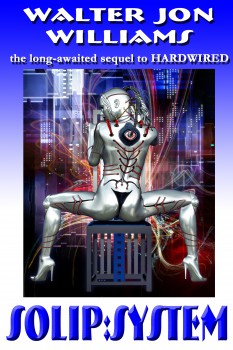 But I knew going in that something like that might happen, and I can’t complain.
But I knew going in that something like that might happen, and I can’t complain.
Many people will see your name and also have no idea of your ethnic background. I confess I was surprised when I learned it. Can you share it with our readers?
All four of my grandparents came from Finland. My paternal grandfather, whose name was Kuusikoski, worked in Canada as a lumberjack before coming to the U.S.
When the Welsh foreman asked him his name, and was told “Kuusikoski,” my grandfather was told, “From now on your name is Williams.” And that was the name he used when he came to the U.S.
I’ve had the privilege of hearing you talk at a lot of cons about the writing process. My favorite story is of you keeping a dream journal, but I also remember you talking about playing music and pogoing through the house to keep momentum, even when your wife is trying to concentrate on something. Care to share more about the unusual means you resort to in order to keep producing novels?
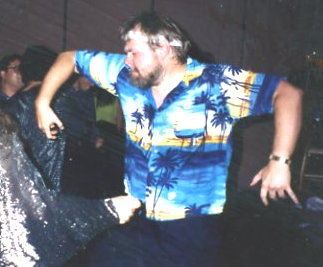 Okay, first the dream journal story: I had got a couple good ideas out of dreams, and my friends encouraged me to keep a dream journal to catch my ideas, as it were, on the fly.
Okay, first the dream journal story: I had got a couple good ideas out of dreams, and my friends encouraged me to keep a dream journal to catch my ideas, as it were, on the fly.
So I put a notepad and pencil by the bed, and one night I woke up certain that I’d had an idea sure to make my fame and fortune. I wrote the idea down and went back to sleep. Next morning, I looked at the pad and read the following: UFOs are really made of bread.
I gave up on the dream journal idea after that.
My thought process seems to be in part physical. I do my best thinking when I’m in motion, so when I’m creating I tend to jump around, or dance, or wave my arms in time to my thoughts.
And when I’m working and get stalled out, sometimes I jump up, turn the stereo to 11, and dance for a while just to get the blood moving. Once I’m pumped up, I can return to the keyboard and blaze away till my body returns to its normal state of torpor.
If my wife is trying to sleep when I crank the stereo, this strategy can provoke Conflict.
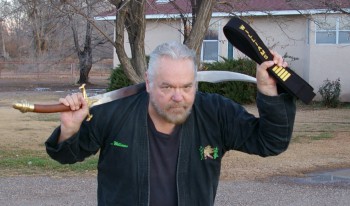 Aside from writing, you’re also a martial artist, and this is something I’ve never asked you about before. I confess I don’t even know which martial arts you do or how you got interested in them. Could you tell our readers more about this?
Aside from writing, you’re also a martial artist, and this is something I’ve never asked you about before. I confess I don’t even know which martial arts you do or how you got interested in them. Could you tell our readers more about this?
I recently tested for my fifth degree black belt in Kenpo Karate. I started because a friend was involved, and because I wanted a form of exercise that wasn’t as boring as free weights or a stationary bike.
I found other reasons for staying, though. The art integrates mind and body — and this, as I just mentioned, is useful for keeping the brain focused. I’ve done things, physically and mentally, that I hadn’t thought were possible for me, and the discovery that I’m much less limited than I expected I was very liberating.
Plus, there’s the whole overcoming-the-fear thing and the being-a-complete-badass thing, each of which is good in its way.
But I have to say that my reasons for staying involved in the martial arts are in the end deeply personal, so personal that I can’t even explain them to myself, let alone in an interview.
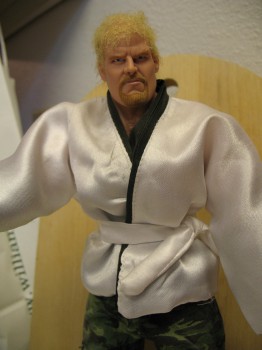
That’s pretty simple, and also pretty dull. My family moved to New Mexico when I was thirteen, and perforce I was dragged along.
You officiated the wedding of Daniel Abraham to his wife Kat. Are you still ordained and performing weddings?
I am a minister in the Universal Life Church, the original mail-order faith. I got ordained for the convenience of any of my friends who might want to get married without having to profess faith in anything but my ability to somehow get them through the ceremony. I’ve done any number of weddings over the years, sometimes in somebody’s living room, and sometimes in rather grander circumstances. On the occasion you mention, I had to learn some Hebrew, and to haul a toilet into the hall (don’t ask).
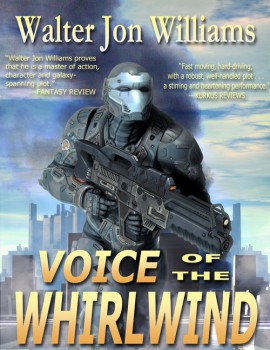 There was one wedding where I was expected to dress as a Druid and speak in Gaelic, but it was snowed out, fortunately before anyone took pictures.
There was one wedding where I was expected to dress as a Druid and speak in Gaelic, but it was snowed out, fortunately before anyone took pictures.
I am also available for bar mitzvahs and children’s birthday parties. My rates are reasonable, and the readings are free.
And it is more than worth it to hire him for the readings alone! Many thanks to Walter, and please check out his new book The Fourth Wall.
–Emily
[…] Book View Cafe (Emily Mah) interviews Walter Jon Williams. […]